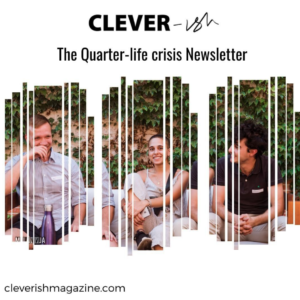For many, the early to mid-twenties is a complicated time of letting go of your old childlike self and embracing adulthood. Becoming an adult is often overwhelming., confusing, and As you climb the age ladder in your twenties, you graduate, move to a new city or start a new job, etc you start to gain new experiences and your life starts to expand and So do your responsibilities. Becoming an adult or as they say ‘adulting’ becomes inevitable. Navigating this period will likely manifest as a quarter-life crisis. During this period you have to learn how to understand yourself and the person you’re becoming while also staying true to your values.
I’ve realized from experience that you can either be intentional in your growth and learn how to understand yourself or you can let situations or life’s circumstances determine who you are. It’s better to be in control.
Below are some steps you can take that would help you be intentional in curating and understanding the person and adult you are becoming.

Becoming more self-aware
Self-awareness is the conscious knowledge of one’s own character and feelings. As you get older it’s important to constantly look within and understand yourself better. Most of us don’t know who we really are and a conscious effort at an introspective look at ourselves is a good step towards better understanding oneself. I constantly try to understand myself better and to look within and find answers to why I react in certain ways to certain situations. Since I started doing this, I began to consciously identify my flaws, strengths, likes, and dislikes, what made me tick, what brought me the most joy, and the real reasons behind my actions.
Understanding my strengths made me more confident and identifying and acknowledging my weaknesses made me focus on growth in those areas and made me a more mindful person. I started trying new hobbies, attempting to learn new skills, and being more socially conscious. I stopped taking a lot of things at face value and cared less about pleasing everybody.
They say if you don’t define who you are, someone or something else will define it for you. When you let people define you, you always try to please everyone and compromise your identity and lose yourself even more.
Learning to say No
Speaking of trying to please everyone… saying “no” is an art that you must learn. I’ve realized that when you say yes all the time both in your workplace and personal life, you start to neglect your own projects and will soon get burnt out. As a natural-born people-pleaser myself, I am still learning this. Learning to say no allows you to prioritize important things and be more intentional in how you spend your time.
Helping people is an important virtue and so is drawing boundaries. Learning what to say no to is an important step in living a more authentic life and building the right habits. n building your confidence, practicing self-awareness, and being a more well-rounded person.
Tightening your circle and forming intentional friendships
As my tastes and preferences changed and evolved, so did my friendships and how I wanted to spend my time. As a teenager, most of my friendships were formed by default -friends who went to the same school, same church, etc. I gained a few solid friendships from this crowd but it took a lot of time and sometimes drama to weed out the bunch so only my true friends remained. As I got older, I decided to be more intentional in making friends and building relationships.
You should seek friendships with people whose values align with yours, people you respect, and people you can learn from. When you find these friends make a conscious effort to spend quality time with them. There is a refreshing peace that comes from having a friend you can have quality conversations with, who will be there for you and you for them. Having a friendship that has mutual growth and support is especially important in your twenties.
In the same vein, you have to let go of unhealthy friendships and relationships. From experience, this is a painful but necessary process. A Nigerian proverb says “twenty children cannot play with each other for twenty years”. When you realize that you are at a different growth stage with some friends, it’s ok to let them go. When an old friend keeps hurting or taking advantage of you, it’s ok to let them go.
How to understand yourself and find joy from within
When you know who you are and are confident in who you are becoming, you start to experience joy. Having joy from within doesn’t mean you don’t get happiness from external sources, it means your happiness and sense of self-worth are not dependent on other people and their actions or inactions.
Friends, family, and situations will always bring us happiness and good times but “joy from within” means when these external triggers are absent you can still feel joyful. When you have intrinsic motivations, your self-worth does not depend on what people say or how they treat you. You find that you do not need anyone’s approval to be happy and you do not need to compare yourself with others. When you understand yourself and your motivations, negative comments, unkind encounters do not make you question your self-worth or the value of your work, talents, or contributions. You know who you are and you love yourself no matter what. Joy from within does not mean you shouldn’t take constructive criticism or neglect opportunities to grow and learn.
Self-growth and alone time
Alone time is crucial to your self-development. It is important to keep learning and reading to expand your knowledge and perspectives to new horizons. Setting time aside for learning, reading, reflection, meditation, or jornaling will positively impact your life and improve your social interactions as well. When you read, you start to form well-rounded and better opinions on social issues, politics, and pop culture. Your interests begin to expand and you pick up new hobbies. You start to sound more like an adult.
Have you made any of these changes in your life or are you currently going through one? Share your thoughts below.
Need more content like this? Join the weekly Quarter-life Crisis Newsletter.
Photo Credits
Eli DeFaria Chris Murray Bewakoof.com Official Kinga Cichewicz












I wish someone had shown me this article when I was much younger. Sadly, it took me to get to my late 20’s to start realizing these things. Thanks for this Jiji, u just reaffirmed what I’ve only just come to realize. There’s so much I wanna write, but I don’t want to start another article in the comments section (lol) so I’ll just stop here.
#peoplepleasernomore
Thank you for sharing this article, and constant reminders that we are the master of our own fate. Defining ourselves instead of letting others define us is very important. Even though it is always tough to end a “toxic” friendship, the pain you/we are going through now, will be changed into gains in the future.
Agreed!
Love this Jiji! So true. I identify so much with all of these things as I enter my late-twenties. I’ve been saying “No” a lot recently both to spending time with people that I just don’t care about, as well as working on projects or doing things that aren’t beneficial for me and my personal and creative growth. It can be really hard sometimes as I’m painfully aware of disappointing people (especially friends/acquaintances), but in the end you just can’t do everything. And the more I say no, the easier it gets to protect my time and say no again next time 😉
Very true Sam. Saying no can be hard but it gets easier with practice and then you can give more of your time to friends and acquaintances that really matter!
I wish I’d read this in my 20s! I started making changes at about 28, and now that I’m 30, I’m glad I’ve left the toxic friends behind me. Sometimes when I meet new people, I almost slip into my old empathetic ways, but at least I’ve learned how to spot the signs.
You make a good point Melissa! I feel like I should write something about learning to spot the signs when making new friends 🙂